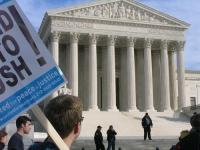BROOKE GLADSTONE: Throughout American history, a constant battle has been waged between citizens claiming the right to protest and government officials who would restrict that speech, especially in time of war. At the center stands the Supreme Court, which has rendered some of its most important First Amendment decisions as the nation fought on foreign shores. During World War I, the court upheld the Espionage Act, which criminalized antiwar speech because such speech hindered military recruitment and gave support to our enemies. It upheld the World War II era Smith Act, which prohibited speech that advocated overthrowing the U.S. government, and it upheld the prohibition on burning your draft card challenged during the Vietnam War. Obviously, these cases were not decided in ways that would please free speech advocates but at least they were heard. Slate Senior Editor Dahlia Lithwick recently noted the curious absence of free speech protest cases during the current wars.
DAHLIA LITHWICK: You see a lot fewer protests happening where someone stands on a soapbox and they're surrounded by other people and they hurl anti-government epithets. And to the extent that they happen, I think that those are not worrisome to the government. But I think the government’s been better able to monitor antiwar sentiment through the Patriot Act and through FISA. If you’re spying on people in secret, you don't need to go out to the city square and put cuffs on them. And also there’s a sense that protest in itself isn't the problem. I think you’re seeing a real shift in what the government perceives to be domestic aiding and abetting of the enemy.
BROOKE GLADSTONE: Which brings us to Holder v. Humanitarian Law Project. This is perhaps the single most significant decision that is related to speech and the war on terrorism, but it wasn't about protest at all.
DAHLIA LITHWICK: This is a case about the Patriot Act, which makes it illegal to give, quote, “material aid” to terror groups, and “material aid” is defined so broadly that it criminalizes certain forms of speech, and so things as simple as telling a terrorist group how they might procure humanitarian aid or how they might engage in non-terror related activities, like alternative dispute resolution. And the question for the people who object to the statute is, wait, wait, wait, wait, what we're doing is we're telling Hamas how to dig wells. We're – we’re telling them how to get humanitarian aid. We’re - in other words, we're trying to help them not be terrorist groups. How can that possibly be providing material aid to terror groups? I spoke to Irwin Chemerinsky, who’s the dean of UC Irvine Law School, and he said that this is really a, a very, very dramatic provision that was upheld because it punishes speech merely advising how to use international law without any showing that it leads to harm, in and of itself. So he feels like it’s a very, very expansive definition of what is impermissible speech, and that it’s quite different. And I think one other thing that’s worth thinking about, from the conversation you and I are having, one would think the Supreme Court wasn't granting speech cases at all. That’s not the case. This happens to be a, a sizzling moment for First Amendment doctrine at the Supreme Court. If you look at the cases that the Court is really interested in, not only do they have nothing to do with war protest, they have everything to do with entertainment. And so, you have a major Supreme Court case about the constitutionality of criminalizing crush videos. Do you know about those?
BROOKE GLADSTONE: An animal is crushed to death under a stiletto heel?
DAHLIA LITHWICK: Yes, as a woman whispers weird sexual enticements to it. So the Supreme Court [LAUGHS] hears that case last year. They hear Citizens United last year, which -
BROOKE GLADSTONE: Which gave corporations the same right of free speech as individuals thereby, allowing them to contribute unrestricted amounts of money to political campaigns.
DAHLIA LITHWICK: But it also starts out as a conflict over a long attack ad on Hillary Clinton.
BROOKE GLADSTONE: Mm-hmm.
DAHLIA LITHWICK: So this is about a movie, first and foremost. This term the big Supreme Court First Amendment case is going to be about banning violent video games. The other big, big case this year is Snyder v. Phelps, and this is the Fred Phelps Westboro Baptist Church. They go around to these military funerals and hold up incredibly offensive signs that say, thank God for dead soldiers, and God hates fags, trying to say that the reason soldiers are dying overseas is because America tolerates homosexuality. So if you lump it together with the other cases I'm talking about, the Supreme Court is very, very interested in the boundaries of angry attacking speech, not all that interested in wartime protest speech. I think the Court is very, very split on these issues of civility. A lot of the justices seem to feel that the Internet changes everything. And Justice Stephen Breyer, one of the most liberal justices on the Court, is really, I think, spearheading this movement that says the Internet makes inflammatory speech much more pernicious and dangerous, so maybe we need to clamp down. So it’s a very, very interesting moment, reflective of the Court just really grappling with what video and video games, how all that is going to interact with centuries-old free speech doctrine. But, as I said, if you just look at it in a vacuum, you would never know there was a war going on, as well.
BROOKE GLADSTONE: Dahlia, thank so much.
DAHLIA LITHWICK: Oh, you’re so welcome, Brooke.
BROOKE GLADSTONE: Dahlia Lithwick is the senior editor of Slate.
